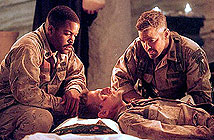|
|
|
|
Three
Kings
|
 |
|
David O. Russell's Three Kings certainly begins boldly. Shortly after the ceasefire called to end the Gulf War, Troy (Mark Wahlberg), an American soldier in the field, spies a distant figure. He doesn't know whether to shoot the guy or not, and his companions – as a series of zip pans reveal – could hardly care less anymore. But he does fire – and immediately the film starts rubbing our noses in the gruesome consequences of this act. Chaos, confusion, moral panic, political satire, gut-churning violence, unsettling black comedy: these are the ingredients for the cocktail mixed by Three Kings. It is – at least until two thirds of the way through – a brave and confronting film, unquestionably mainstream American cinema's most interesting reflection to date on the more shameful aspects of the Gulf War. Russell uses a narrative trick rarely used since the heyday of Billy Wilder. The film sets out to tell us a great deal about this War, via a bunch of yahoos who understand very little of what they perpetually stumble into and catalyse. Only slowly do these unlovely opportunists figure out the differences between the different Iraqi factions. When one particularly dim soldier, Conrad (Spike Jonze), is quizzed by a local, "So you've been trained to kill all Iraqi people?", he enthusiastically replies: "Sure!" Meanwhile, Conrad's more intelligent companions – Troy, Archie (George Clooney) and Elgin (Ice Cube) – are slowly, painfully piecing together the awful realities around them, approaching the fateful moment when they must face their personal responsibilities and take sides. Satire is an extremely difficult form, because it so easily becomes repetitious and monotonal in its flattering appeal to a knowing viewer. Russell – taking a great leap forward after his wry, domestic comedies Spanking the Monkey (1994) and Flirting with Disaster (1996) – at least tries to vary his targets, amid a busy profusion of jibes and vignettes. At times he detonates the clichés of the war film genre – as in the iconic, low-angle shots of these 'kings' surrounded by majestic, streaming clouds, or the inserts of Troy's sunny domestic life back home that seem to mock similar visions in Malick's The Thin Red Line (1998). At other moments, he targets the role played by the news media and even showbiz in the War – although here the comedy is rather lame and underdeveloped, way below Elaine May's deadpan savagery in the grossly underrated Ishtar (1987). What saves Three Kings from being merely a told-you-so exercise in political righteousness is the relentless and unsettling ambiguity of its tone and style. Russell gives events a breathless, sometimes deliberately tasteless, rock'n'roll energy. For periods of the movie we are sucked in by the raunchiness and gleefulness of these American party animals as they rampage around the landscape in search of the bullion booty secured by Saddam. But then we are suddenly wrenched out of this identification by something shocking, poignant or tearingly instructive – like the bitter anti-US monologue delivered by Troy's Iraqi torturer. The look of the film is even more daring than its switches of mood and viewpoint. Use of hyper-saturated colour in most outdoor scenes disconnects the characters from the landscape in which they stand. The technique mirrors their own, freaky sense of unreality – and also their fatal fantasy that they are inside some glamorous action movie, invincible and sure. Like Francis Coppola's Bram Stoker's Dracula (1992), Oliver Stone's Natural Born Killers (1994) and David Fincher's Fight Club (1999), Three Kings explores remarkably weird and certifiably postmodern ideas related to the human body and its interior sensations. From its opening scenes the film conveys, in microscopic detail that is fascinating and excruciating in equal measure, the gory facts of physical injury and death. Again, Russell is emphasising the unreality or hyperreality of this War – and the ways in which contemporary culture dematerialises every big moral and political issue by, paradoxically, concentrating on the minutiae of viscera, X-ray vision and ultra-personalised feeling. Three Kings does not quite make the distance or meet all the challenges it sets itself. Too many of its most compelling ambiguities are cleaned up and cleared away by the denouement. And, like many satires, since it does not trade in conventional, three-dimensional characters, it tends to become rather repetitious half way though, running out of new variations on its themes. But, whatever its flaws, this is a unique and important film, uniformly well acted (the casting of Clooney is particularly inspired) and constantly thought-provoking. Mainstream American cinema is rarely so deliberately reckless and contentious. MORE Russell: I © Adrian Martin January 2000 |
![]()